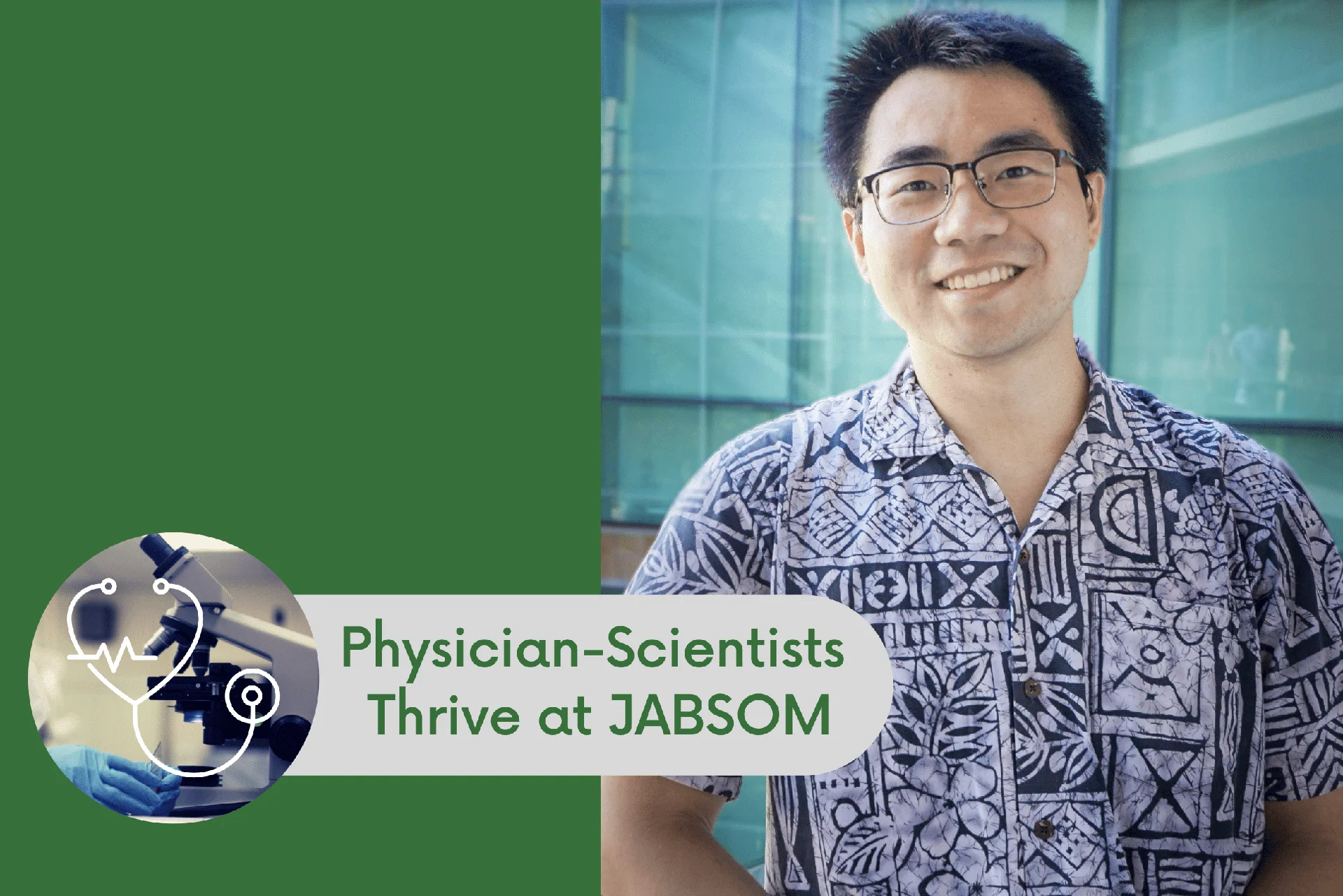
While the National Institutes of Health has concluded that the nation is failing to attract too few young physicians into scientific exploration, the University of Hawaiʻi at Mānoa John A. Burns School of Medicine (UH JABSOM) has seen an uptick of medical students with a penchant for research. At many medical institutions across the U.S., tuition is waived and a stipend is granted to students pursuing an MD-PhD or DO-PhD. However, this is not the case in Hawaiʻi, which makes it “even more impressive if JABSOM has medical students graduating with PhD degrees as well,” said JABSOM Associate Dean for Research Dr. Mariana Gerschenson.
Jiaming Xue’s story, below, is the last of a four-part series featuring JABSOM medical students who are working on or have already earned their PhD. See “related stories” at the bottom of this page to read them all.
Hoping to use an MD-PhD to fight against cancer
Jiaming Xue always knew he wanted to become a physician scientist as he believes clinical trials are the best and only way to find better treatments for cancer. Xue was recently highlighted in a national journal for his research revealing important mechanisms regarding how asbestos fibers cause cancer, specifically mesothelioma. Currently a second-year JABSOM medical student, Xue graduated with his BS in Biology at UH Mānoa and his PhD in Cell and Molecular Biology in August 2020.
In a recent study, Xue found that asbestos can cause cell transformation through activating HMGB1-mediated autophagy, or a normal physiological process in the body that deals with destruction of cells in the body. He also demonstrated that Clomipramine (Anafranil), a commonly used FDA-approved antidepressant, has the potential to inhibit initiation of cancer formation in human cells.
“If we understand how cancer occurs, we can find better ways to target this process and block cancer development. Asbestos is a known carcinogen, but we don’t fully understand the underlying mechanism. My work has revealed one key aspect of how asbestos causes normal cells to become cancerous,” Xue said. “Building on this premise, the next step would be to test this drug in mouse models and hopefully, in human clinical trials in the future. Even though mesothelioma is one of the rare forms of cancer, understanding asbestos-mesothelioma relationship could provide us with new approaches to environment-cancer interactions in general, which may be applicable to other cancers.”

Photo courtesy of Jiaming Xue
According to the Centers for Disease Control, cancer remains the 2nd leading cause of death in the US.
“It saddens me that despite worldwide efforts, we still do not have a ʻcureʻ for cancer. I hope to join the national movement of finding new and better cancer treatments which will not only save lives, but also help the families burdened by this tragic disease,” Xue said.
Xue, a native of Xiʻan China, says that although he was not born in Hawaii, he spent most of his life here. He is deeply attached to this place he calls home and hopes heʻll be able to return and practice in Hawaii after post-residency training.
“I believe JABSOM can provide me with the best education and training to help me become the oncologist I want to be” said Xue, also the co-president of the JABSOM Oncology Interest Group, which works with local physicians to promote cancer awareness in the community.
As for other medical students interested in pursuing a PhD, Xue encourages them to volunteer in a research lab first and talk to school advisors, lab principal investigators and other PhD students. He says it is not an easy decision to make and requires a lot of planning and time commitment.
Xue also believes that his graduate studies trained him to become more analytical and objective, which will only strengthen him as a future physician.
“It is important for doctors to be sympathetic and caring to their patients, but it is also equally important for doctors to be determined and composed in order to make tough decisions and save lives,” Xue said.
Xue is grateful for Dr. Haining Yang, for her guidance and mentoring throughout his graduate school journey. He also thanks Dr. Michele Carbone and the Dr. Carbone & Dr. Yangʻs Mesothelioma lab of the UH Cancer Center for the unique opportunity. He also acknowledges the support received from Dr. Michelle Tallquist and the CMB PhD program as well as the support from JABSOM, especially Dr. Lawrence Burgess, Dr. Kristen Teranishi and Jayme Young.